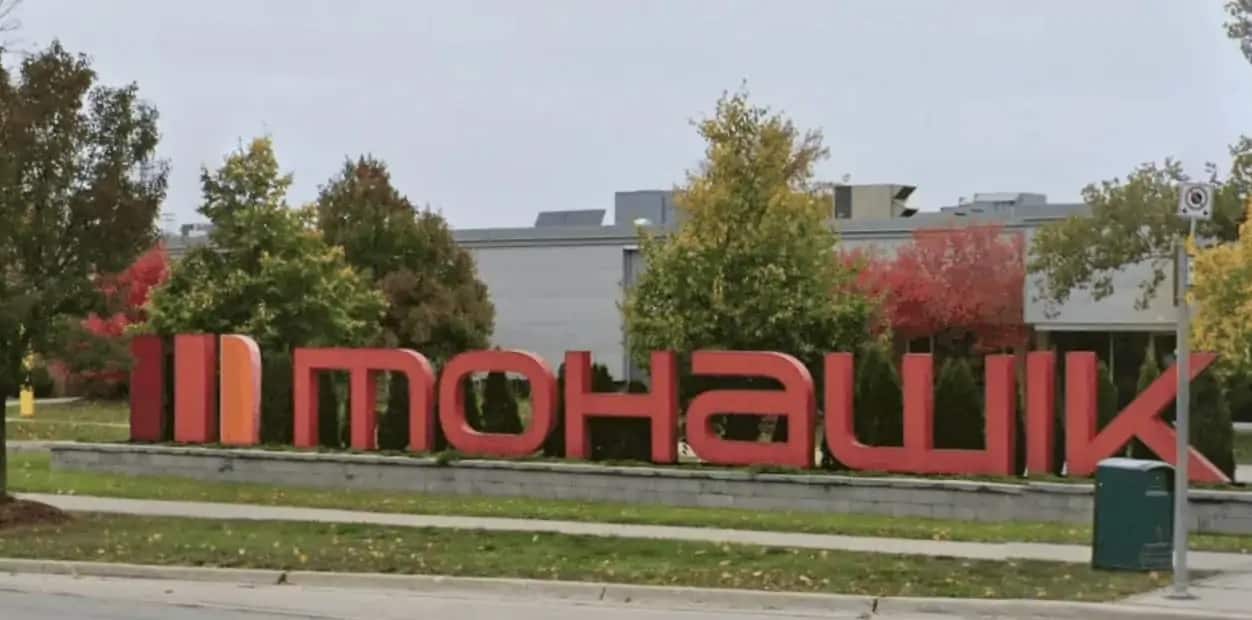Mohawk College in Hamilton making headway on ‘Challenge 2025’
Published November 16, 2022 at 12:14 pm

Meeting 2-of-3 goals at the midpoint of a five-year workforce recovery plan represents something to grow on for Mohawk College in Hamilton.
Mohawk issued a progress report today (Nov. 16) on Challenge 2025, which was initiated 3½ years ago by president and CEO Ron McKerlie to address poverty, undereducation, labour shortages, unemployment and underemployment in the Greater Hamilton Area. The plan drew on City School by Mohawk, which has made college education more accessible to underrepresented people for the past seven years through community-based classrooms and mobile classrooms in neighbourhoods and communities.
Khadija Hamidu (executive director, Workforce Planning Hamilton) and Sara Gill (executive director, Adult Basic Education Association) are also co-chairs of Challenge 2025. The founding co-chairs, McKerlie and Social Capital Partners chairman and founder Bill Young, will now be advisers.
The initial goal of Challenge 2025 was to engage 4,000 learners, including 3,000 through transitional pathways. Halfway through, Mohawk has reached 2,500 learners. It has exceeded a goal to loop in 100 regional employers. The other goal was to “partner with other communities across Canada.” On that front, Mohawk is part of a four-college alliance of 4 colleges that has delivered a material handling course to 143 students in British Columbia, Manitoba, Nova Scotia and Ontario.
“Working with our valued community and education partners, a great deal has been accomplished in the first half of our mandate,” McKerlie states. “I am confident, under this new leadership structure, even more good work will be done. Mohawk College remains deeply committed to supporting this important community-driven initiative and the people and employers involved, for the good of our community.”
Hamilton, as a city that has weathered the effects of automation in the heavy manufacturing sector, faces a unique suite of socioeconomic challenges with supporting its entire population. Young says the aforementioned City School could be a model for other Canadian cities that are wondering how to offer skills training and, in turn, solve labour shortages.
“City School reaches marginalized and under-represented communities and provides them with supportive training and job-specific skills that are in demand in today’s labour market,” Young says. “It also facilitates direct access to employers that are committed to hiring people with these skillsets.
“Challenge 2025 broadened the scope and scale of that demand-led approach… The success of this initiative in Hamilton and other cities can serve as a template for how skills training should be delivered at a system-wide level and has the potential to make generational change for thousands of people who face employment barriers.”
Further priorities include a creating an Indigenous workforce development strategy; building a rapid skills training lab at Mohawk’s The Joyce Centre for Partnership & Innovation; forming a new partnershiksp with local residents in the Ontario Works and Ontario Disability Support Program (ODSP); and developing a comprehensive strategy for offering micro-credential for participants.
The leadership pivot to Gill and Hamidu is part of a plan to further link Challenge 2025 with resources in the wider hamilton commmunity, Mohawk stated. Gill will lead an action team whose goal is support learners with the necessary skills and to reduce barriers to education on the way to entering the workforce.
“Challenge 2025 leverages the expertise and passion of community partners and community members to achieve social impact,” Gill says. “The Employee Pathways Action Team is working to create a safe and supportive space for participants that focuses on wellness, building confidence and moving forward.”
Mohawk said Hamidu will lead an action team that will support employers for their workforce needs. Its includes providing EDI (equity, diversion and inclusion) resources and advice.
“I am very excited to continue our partnership with Mohawk College and the Challenge 2025 initiative,” Hamidu states as we embark on Employer Education,” Hamidu states. “Being able to provide meaningful resources on (EDI) to our local employers has been a top priority between both organizations. Our goal is to help employers with the most up-to-date labour market Information that will better serve their businesses and overall workplace culture.”
Mohawk has three primary campuses in Hamilton. There is Fennell on Hamilton Mountain, a Stoney Creek campus, and the Mohawk-McMaster Institute for Applied Health Sciences in west Hamilton. It also recently opened a campus in Mississauga.
insauga's Editorial Standards and Policies advertising





